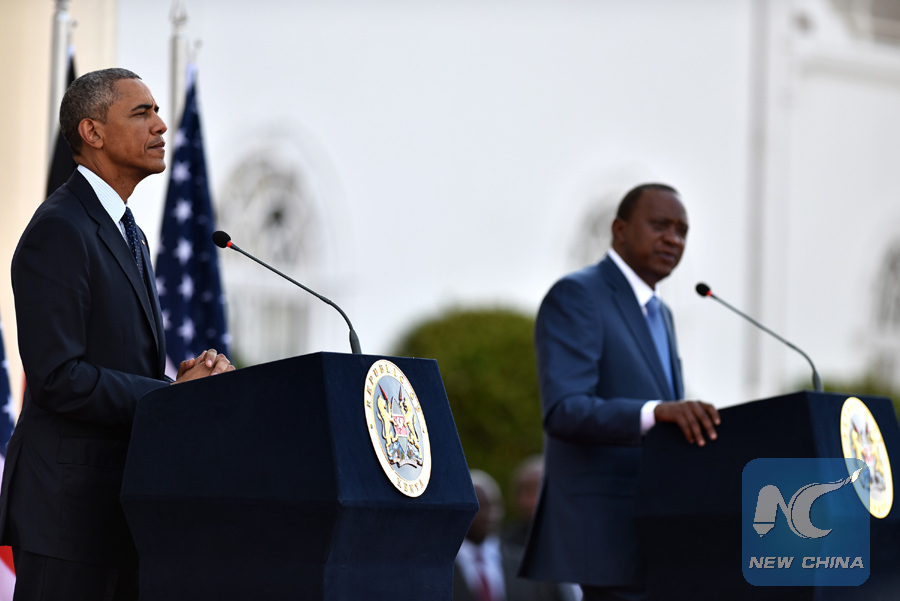The homecoming king
- By Sun Chenghao
 0 Comment(s)
0 Comment(s) Print
Print E-mail Beijing Review, August 4, 2015
E-mail Beijing Review, August 4, 2015
|
|
|
U.S. President Barack Obama (L) and his Kenyan counterpart Uhuru Kenyatta attend a joint press conference in Nairobi, Kenya, July 25, 2015. Kenya and the U.S. on Saturday reaffirmed their commitment on security cooperation and in the war against terrorism to help prevent future terror attacks in the East African nation. [Xinhua/Sun Ruibo] |
Twenty-eight years after his first visit, U.S. President Barack Obama set foot once more on the soil of Kenya, birthplace of his father and a place which some people believe to be more his hometown than his native Hawaii. On the first visit, Obama was met by a half-sister and an aunt in a battered old Volkswagen Beetle. In 2006, he visited the country again as a senator, criticizing human rights abuses and corruption in Africa and receiving a hero's welcome in the process.
This time around, strict security measures were taken ahead of President Obama's visit, with 10,000 police officers from Nairobi being deployed to prevent al-Qaeda's Somali-led affiliate, the al-Shabab, from disrupting his three-day visit. One can only speculate, but it would not be too much of a stretch of the imagination to surmise that under such radically different conditions, Obama's most recent visit must have stirred in him very different emotions than did his first.
Fatherland
Ever since Obama was sworn in as the U.S. first African-American president in 2009, expectations as regards his Africa policy have been high. Yet during his first term, he never paid an official visit to any country on the continent, not even Kenya, a country whose approval rating of the U.S. president is higher than that of the U.S. population. Some critics claimed that despite his roots, Obama was attaching less importance to Africa than his two predecessors.
Relieved of the burden of seeking reelection, in his second term, Obama has started a drive to secure his diplomatic legacy. Along with Cuba and Iran, Africa could prove one more jewel in Obama's foreign policy crown. In 2013, he traveled to Senegal, South Africa and Tanzania to meet with leaders from the governments, business communities and the private sectors. Last year, he held the first U.S.-Africa Leaders Summit in Washington, inviting 50 African leaders and senior officials to an event which primarily focused on trade, investment and the security of the continent, raising U.S.-Africa relations to new heights.
His recently concluded African tour started with a visit to Nairobi for the annual Global Entrepreneurship Summit and was followed by a short stay in Ethiopia where the African Union is headquartered. It was Obama's fourth trip to Sub-Saharan African as U.S. president, more than any of his predecessors have made. The trip had three major goals.
First on the list was further promoting economic cooperation between the United States and Africa. A conspicuous feature of Obama's Africa policy is improving bilateral commercial relations between the two parties while expanding cooperation in the fields of trade, investment, agriculture, food, energy, and electricity. As a country fast becoming an African leader in terms of financial institutions, healthcare infrastructure, education and cellphone technology, Kenya is naturally eager to draw more American investment and business.
During the U.S.-Africa Leaders Summit last year, Obama made a series of commitments amounting to more than $33 billion in value, supporting economic expansion all across Africa. The reauthorization of the African Growth and Opportunity Act (AGOA) was passed by Congress on June 25 with President Obama signing it into law on June 29, providing certain African countries with preferential trade conditions such as more quotas and duty-free entry into the United States. Participation in the annual Global Entrepreneurship Summit, a U.S.-backed initiative that brings together young business leaders from all over the world aims to continue this positive momentum by engaging with business leaders and government officials.
Second was seeking collaboration on anti-terrorism. Kenya's economic development has of late been curbed by vehement attacks from various terror groups, among which al-Shabab is the most aggressive. Obama said both countries had systematically reduced the territory that al-Shabab controlled, but the problem had not been resolved. Kenyan President Uhuru Kenyatta placed a lot of stress on anti-terrorism cooperation between the two countries. Nonetheless, the prospect of cooperation in this particular field is not so promising due to the U.S. unwillingness to be embroiled in another battle in Africa what with the nagging persistence of the ISIS (Islamic State) issue. Security cooperation might therefore narrowly focus on technical assistance, military training and limited intelligence sharing.
Last but not least on Obama's to-do list was putting the stamp of "value diplomacy" on his African tour. During his visit, Obama called for gay rights in Africa, comparing homophobia to the racial discrimination he had encountered in the United States. He openly expressed his disagreement with his counterpart Kenyatta at a joint news conference after their meeting, "As an African-American in the United States, I am painfully aware of what happens when people are treated differently under the law. I am unequivocal on this," said Obama. However, countenancing gay rights was perhaps a step too far for Kenyatta, who termed it "a non-issue."







Go to Forum >>0 Comment(s)